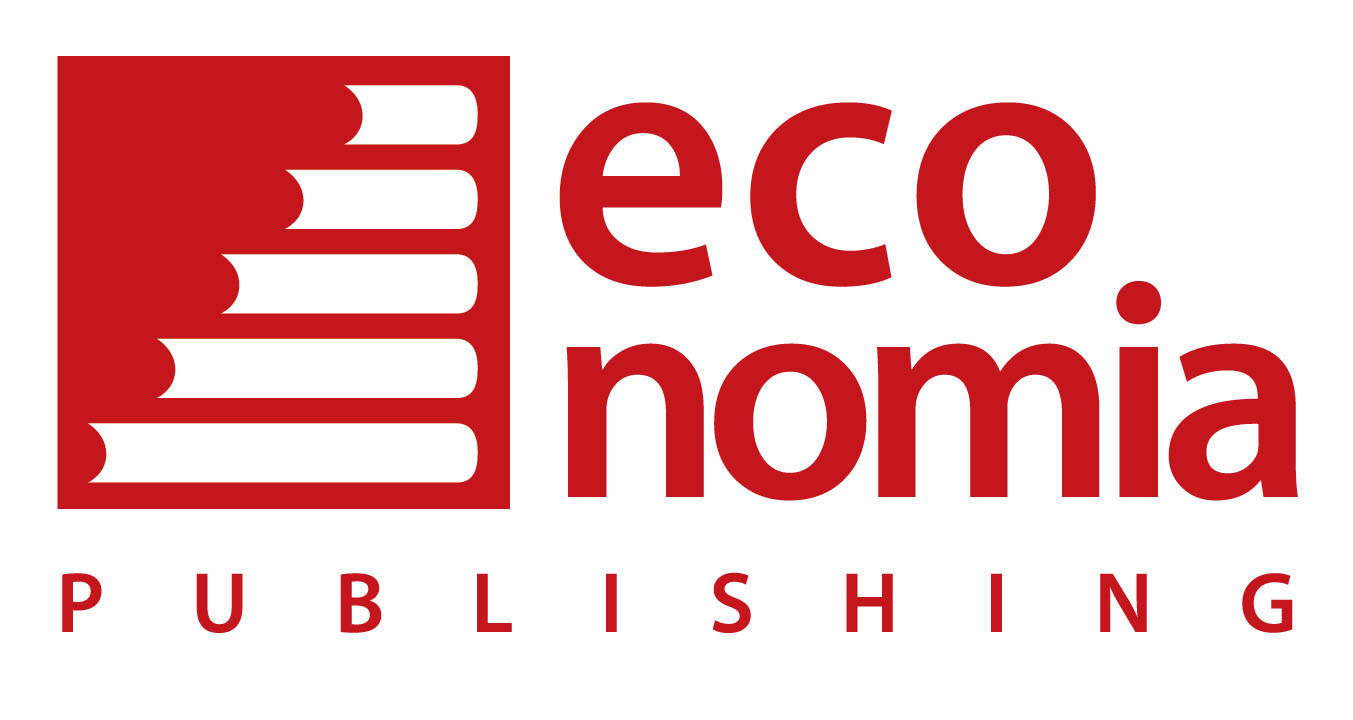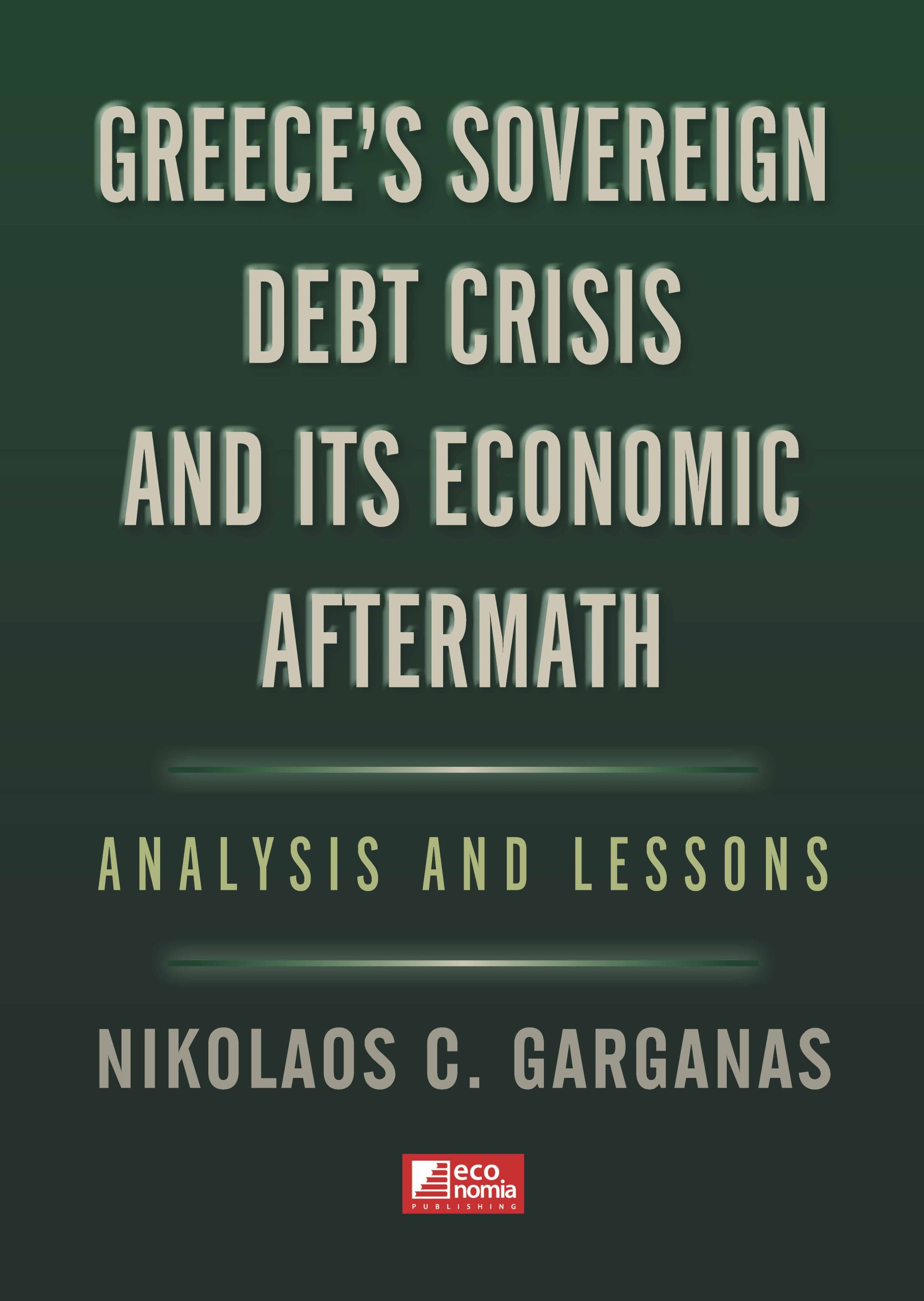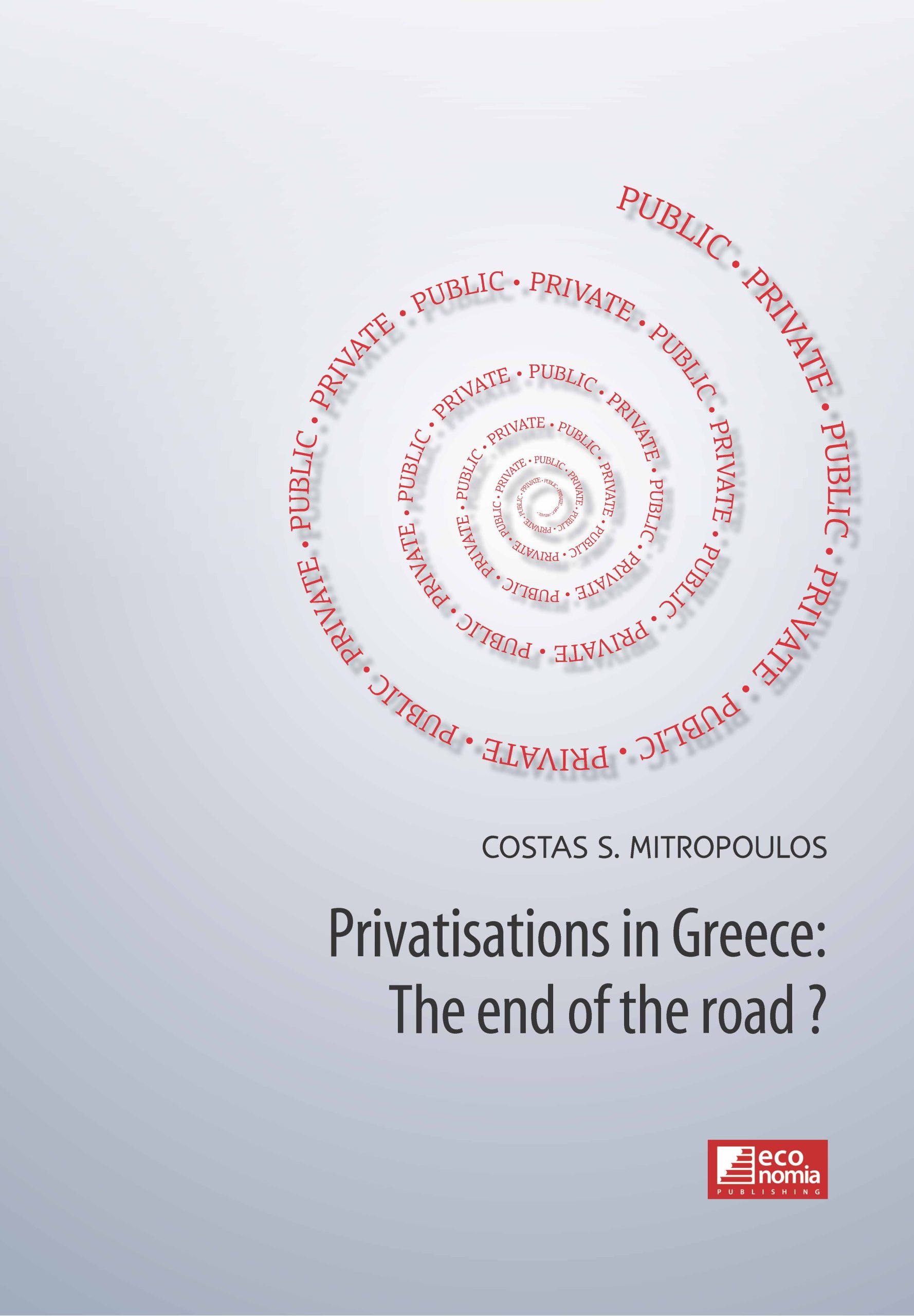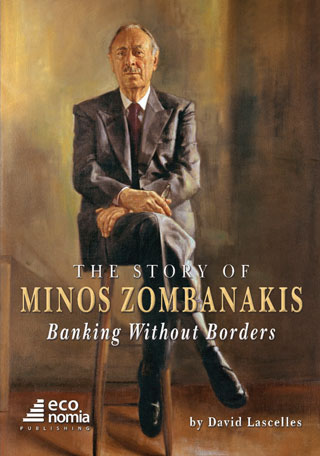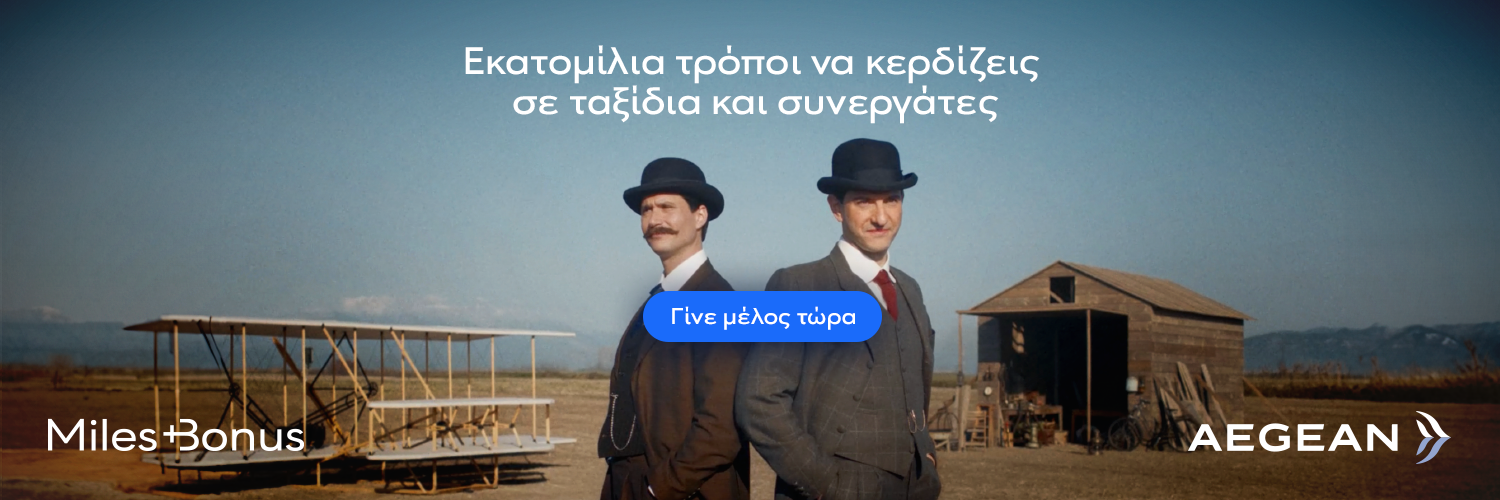Kerkyra Publications
Kerkyra Publications was founded in 1996 and publishes books and historical collections focused on Greek economy, entrepreneurship, and culture. Named after the island Corfu (spelled Κέρκυρα in Greek) where his father originated from, Spyros Vovolinis was a pioneer of Greek economic journalsim and publishing. He first published the Viomichaniki Epitheorisis in 1934; books like the five-volume collection entitled the Great Greek Biographical Dictionary (written by Konstantinos Vovolinis) were published in the Viomichaniki Epitheorisis from 1958 to 1962. The efforts of Spyros Vovolinis laid the foundation for this company, and his beliefs and philosophies continue to inspire our efforts to educate Greek and international readers on our heritage, economic history, and traditions.
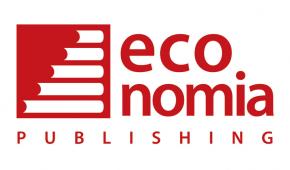
a) Economic, business, management and HR books
b) Publications based on archival material
c) Biographies
d) Special business publications
e) Corporate publications (on order)
Economia Publishing is organizing seminars, conferences, lectures, book or corporate presentations, product launches, exhibitions, as well as a wide range of events related to the financial, cultural and social life of Greece.
- In 2012, 2,656 files of unpublished material pertaining to the five-volume project Great Greek Biographical Dictionary by Konstantinos Vovolinis have been deposited to the Gennadius Library.
- In 2020, the archive of the Viomichaniki Epitheorisis review, published by Spyros Vovolinis magazine from 1934 to 1995 has been deposited to the Historical Archive of the Bank of Greece.
- In 2023, part of the archive of the monthly financial magazine Oikonomiki Epitheorisi (historical continuation of the Viomichaniki Epitheorisis) from 1995 onwards was added to the Historical Archive of the Bank of Greece.
- Part of the Library of the Vovolini brothers has been deposited to the Library of the Bank of Greece and to the Historical Archive of Public Power Corporation.
- In 2019, Alexandra K. Vovolini established the Society for Political & Economic Studies Vovolini CnPC – where her family and personal archive are deposited; it has as its objective to promote research and to publish in the fields of political, economic and business history, with the aim of preserving historical memory and highlighting unknown aspects through the use of archival material of the Vovolini brothers. The first such publication of the company is the book ΓΡΑΜΜΑΤΑ ΠΟΛΕΜΟΥ (War Letters), a collection of correspondence from Spyros and Konstantinos Vovolinis to their mother, Maria Skepastianou, when they were stationed in Epirus fighting against Axis powers during World War II.
Historical Overview
The magazine Viomichaniki Epitheorisis (VE), which appeared in 1934, emerged as part of the country’s early 20th century publishing activity. The life project of Spyros Ant. Vovolinis, it filled a gap in the field of financial news and journalism. Though only 24 years old at the time, S. Vovolinis was already knowledgeable and experienced in journalism. The publication of VE was inspired by a personal ambition and a vision laid out in ‘Our goals’, his rigorously written main article in the magazine’s first issue of July 1934.
From its inception VE had a number of prominent journalists and experts on board, including outstanding personalities of the industrial sector (including the businessmen and heads of the Hellenic Federation of Enterprises (SEV) N. Kanellopoulos, A. Hatzikyriakos, N.I. Dedes) and the country’s political life (for instance, L. Kanakaris-Roufos, I. Pesmazoglou, and St. Costopoulos). In response to that period’s demand for more comprehensive information on international economic developments, VE also sought to collaborate with columnists and editors who contributed, alongside the main features, news and analysis on foreign issues (for instance, on foreign industrial policy and production, international exhibitions, and technological innovation).
The review also published minutes from the general meetings of collective organizations (e.g., by SEV), banking institutions (e.g., reports of governors of the Bank of Greece, the National Bank of Greece), and the findings of the Supreme Economic Council, with the aim of providing accurate and objective news to its readership. Besides articles of interest, there were regular Op-Ed columns, such as the ‘Notes’ (which continued well into the 21st century!), through which the magazine’s editors addressed and commented on current issues in the industrial sector, the economy, society and public policy, often proposing solutions (sometimes in a tongue in cheek spirit, but buttressed by facts and thoroughly researched). The covers of its first issues were plain, but in subsequent decades they became visually captivating and innovative, especially by the financial press’s conventional standards.
The VE quickly consolidated its position in the industrial and broader economic world thanks to the prestige and overall quality of its content. The growing number of advertisements – a source of significant revenue – was proof of the magazine’s upward trend and gravitas.
The dark years
The VE continued coming out on a regular basis despite the adversity of the turbulent World War II years and the Occupation. It was briefly run by Lazaros Piniatoglou (a chemist and journalist), who was a friend and associate of S. Vovolinis after the latter enlisted and was wounded on the Albanian front. In 1942, during the German Occupation of Greece, L. Piniatoglou along with Konstantinos Ant. Vovolinis (the founder’s brother) and Ioannis Milios also published the clandestine newspaper Ellinikon Aima. S. Vovolinis also worked in this project, alongside his work at the magazine. The VE, however, ‘shrunk’. Issues became sparse, though they still featured interesting material (e.g., on wheat, on the problems and potential of the Greek industry, on workers’ salaries, social security, on the country’s post-war reconstruction, on the road network, the energy issue, etc.)
The second generation
In 1990 S. Vovolinis, now of then in an advanced age, handed over the magazine’s reigns to his niece and daughter of his brother Konstantinos, Alexandra K. Vovolini, a contributor to VE since the 1970s. Under her lead, the VE restructured and was brought up to par with the latest printing standards. Its appearance was upgraded and material was added alongside long-running columns and sections. The magazine itself underwent a series of rechristenings: from Viomichaniki Epitheorisis to Viomichaniki Epitheorisi in 1991, to Viomichaniki Oikonomiki Epitheorisi in 1997, to Oikonomiki Viomichaniki Epitheorisi in 1999 and, finally, to Oikonomiki Epitheorisi in 2004). Also, the review switched from a subscription only basis to kiosk distribution in 1994.
From Kerkyra Publications to the Economia Group
Today, the Economia Group, which evolved from Kerkyra Publications, represents a new interactive business model for comprehensive and incisive news. It also spearheads the publication of Oikonomiki Epitheorisi, which over a period of 87 years has been an active participant in Greece’s economic development efforts. Besides being a rare instance of longevity in the world of Greek financial and economic news, it is also an example of how tradition and innovation can complement each other.
From January 2023, the economic magazines of Vovolini journalistic family (Oikonomiki Epitheorisi & Greek Business File), as well as the www.economia.gr website were assigned to the new company Economia Media S.A.
During the first decades of the 20th century, the economic review Viomichaniki Epitheorisis (V.E.) became one of the most influential publications in Greece. The review was the culmination of Spyros Vovolinis life work, created to fill a gap in the field of Greek economic journalism and social commentary. At the age of only 24, with knowledge and experience in journalism, S. Vovolinis proceeded to publish the magazine with ambition and vision; the objectives were aptly presented in the main article of the first issue, “Our goal” (July 1934).
From the very first issues, V.E. secured the cooperation of distinguished journalists and scientists, as well as prominent personalities of the business world (such as N. Kanellopoulos, A. Chatzikyriakos, N. I. Dedes, president of the SEB, etc.) and the political world (e.g. L. Kanakaris-Roufos, I. Pesmazoglou, St. Kostopoulos, etc.), responding to the demand of the time for more extensive information on international economic developments. V.E. also had contributors who enriched its articles with news and analyses on foreign issues (e.g. industrial policy and production of other countries, international exhibitions, technological achievements, etc.)
The review also included the minutes from general assemblies of collective bodies (e.g. SEB), banking institutions (e.g. reports of the governors of the Bank of Greece, the National Bank of Greece, etc.), and conclusions of the Supreme Economic Council. These assemblies were recorded and transcribed in order to provide the V.E. readership with accurate and objective information. Apart from interesting data-driven articles, there were regular ‘opinion columns’. ‘Notes’ was a column where the editorial staff reflected on current issues of industry, economy, society and government policy – proposing at times taunting but always intellectual solutions to these issues.
V.E. quickly established its position in the industrial and wider financial world thanks to the general quality of its content. The increasing number of advertisements in the publication – which provided the publisher with substantial income – was evidence of the magazine’s growing prestige within the Greek public.
The difficult years
During the turbulent years of the Second World War and the Occupation, the regular publication of V.E. continued, despite all adversities. For a short period of time, the editor’s colleague and friend Lazaros Peniatoglou (a chemist and journalist) oversaw its publication, after S. Vovolinis was drafted and wounded on the Albanian front. During the occupation period, L. Peniatoglou, together with Konstantinos Ad. Vovolinis (brother of Spyros Vovolinis) and Ioannis Milios published the underground newspaper Ellinikon Aima (1942). S. Vovolinis was also a partner in this project, alongside the ‘shrinking’ V.E. The issues were sparse, but contained compelling material on war rationing, the problems and potentials of Greek industry, the shaping of workers’ wages, social security and studies on the post-war reconstruction of the country, the road network, and the energy problems faced by Greece and its citizens.
Post-war development
The second phase of the development of V.E. coincided with the efforts to reconstruct and modernize post-war Greece. The density of the review increased, its typographical appearance improved, the circle of contributors expanded (with journalist Stavros Kanonidis, who wrote for the V.E. from its first steps until 1964, leading the way), and its contents diversified. Supporting the steps towards the industrialization of the country, the V.E. emphasized the systematic presentation and analysis of industrial and technological issues, both domestic and international. The presentation of scientifically based proposals and solutions to the country’s economic and technical problems was what made it so innovative for its time (e.g. the Rio-Antirio link, energy saving, organization of public institutions, etc.). In addition, it extended its interest to other sectors of the economy, analysing the manufacturing industry (such as shipping, tourism, agriculture) as well as interpreting changes in scientific, cultural and social issues. This is evidenced by the particularly impressive special column containing detailed book reviews under the title ‘Scientific Review’ in 1948, and a few years later was changed to ‘Book Review’.
From the mid-1950s V.E. abandoned the simple cover with its abstract imaging referring to industrial issues. Constantly focused on the promotion of Greek industry, it proceeded to diligently study industrial units, not only old and powerful ones, but also budding ones. Already in 1935, the cover of the V.E. contained the statement that an affiliate of the magazine was visiting factories with the aim “on the one hand, to collect the data necessary for the compilation of our review for the publication of the descriptions of Greek factories and, on the other hand, to ensure close cooperation with the entire industries world”.
Among the important articles of that period, a text by writer M. Karagatsis entitled ‘The attitude of the State towards industry and the social contribution of Greek industrialists’ (1953) stands out. This text marked the beginning of the publication of the views of industrialists, journalists, and writers in the context of a ‘constructive debate’ through the magazine over the future of Greek industry. In 1957, S. Vovolinis and V.E were awarded Commendation on part of the Athens Academy in 1957 ‘in recognition of the 25-year career and for the contribution to the research of Greek economic issues and to the general development of the Greek economy’.
Publishing activity
True to its original declaration that “it will examine all current industrial issues” and that “judgments, suggestions and proposed actions… will assist the guiding general industrial progress of the country”, V.E. undertook the editing and the publication of the proceedings of the Congresses of the Chambers of Commerce and Industry of Greece, from 1955 to 1964 (the first congress to the fifth, on the basis of the regulations issued in 1952). The idea of a comprehensive publication of the conclusions of the Chambers of Commerce and Industry had been an objective of S. Vovolinis since 1936. At that time he had published an extra commemorative issue covering the General Conference of Chambers of Commerce (which had taken place in Patras in June 1936). Also, V.E. publications included reprints of studies and research that had been published in the journal (e.g. ‘The Foundation for the Printing of Bank of Greece Banknotes’, research by the V.E. editor-in-chief, Fotis P. Konstantinidis, in 1954).
A further major publishing project of V.E. was the Great Greek Biographical Dictionary (1958-1962). K. Vovolinis, with a group of contributors, highlighted pioneering industrialists and entrepreneurs who were instrumental to the evolution of the Greek economic sector. S. Vovolinis enthusiastically supported this bold attempt to record the economic history of Greece (after all, S. Vovolinis’ interest in history had already manifested itself from the first steps of the V.E.). The Great Greek Biographical Dictionary, for which the Vovolinis brothers were awarded the Athens Academy Prize in 1964, did not depart from the initial aspirations of the V.E. publisher, who believed – as did his brother Konstantinos – that ‘from the sum of the earlier works, living reality, that is, history in progress, is composed’. However, the Great Greek Biographical Dictionary was not considered a publishing success as economic history did not appeal to a wide readership at the time. As interest is growing nowadays, the Great Greek Biographical Dictionary serves as a unique source of historical information, since the detailed biographies are composed of rare documents and data.
A new breath of life
In the 1960s V.E. was modernised and further developed, with a staff of competent contributors, both older (such as Panagiotis Katiforis, Potis Tsibidaros, chemist Ioannis Kandilis, Klearchos Mimikos, etc.) and younger (such as Katerina Daskalaki, Dimitris Karamanos). Although younger, Karamanos, who worked under S. Vovolinis and was his close friend, took over the editorial direction of V.E. He brought with him a newfound youth to the review, evident from its new elegant covers. The covers in early days were simple, but later illustrations were striking and advanced for the financial press, and complimented the inventiveness in the structure of the material. Its content was also upgraded with new columns like one entitled ‘Άδολα και Ανόθευτα’ that was introduced in 1965, which utilized wit to comment on Greek and foreign affairs.
During the following decade the V.E. continued its successful course – but the sudden death of S. Vovolinis’ brother Konstantinos in 1970 was a detrimental blow to the creator. During this period, particular emphasis was placed on fact-based information on international economic issues. Thus, in 1976, the exclusive cooperation with The Economist (to date) was secured as a continuation of the first bold step (albeit smaller in scope) in the same direction taken in the previous decade after partnering with The Financial Times. At the same time, by broadening its content (e.g. the new column on the stock market from 1978), V.E. further consolidated its unique position in the financial press with the richness and validity of its steadily updated material.
The proliferation of advertisements reflected the strength of V.E. and its readership growth. From its very first steps V.E. had established a special column, “Those who passed away”. This provided rich biographical data on deceased personalities of the Greek economy and business society. However, during the 1980s, the obituaries took a special form, covering extensively the business activities of those biographed, and constituting an invaluable source of data for Greek economic history in general. Some notable figures from these tributes are Evangelos A. Papastratos, Dimitris T. Angelopoulos, Christoforos A. Katsampas, Alexandros Tsatsos, and Bodossakis-Athanasiadis.
The second generation
As he became older, S. Vovolinis handed over the review in 1990 to his niece, daughter of his brother Konstantinos, Alexandra K. Vovolinis-Laskaridis, who had been writing for V.E. since the 1970s. Under her direction, V.E. was reorganized and remodeled, in line with more modern typography developments; it underwent aesthetic changes as the material focused on Greece’s changing economic climate, all the while maintaining traditional columns. The name of the review was gradually changed, and finally became known as Oikonomiki Epitheorisi in 2004. Whereas previously the review was only available through subscriptions, it has also been sold on newsstands since 1994.
In 1991, a quarterly financial publication in English was launched entitled Industrial Review Special Survey Series, and renamed Business File in 1998. With extensive coverage of sectors of the Greek economy, the idea for this publication was rooted in a radical initiative of V.E. founder S. Vovolinis, adapting the review to the prospect of Greece’s association with the EE, that occurred in 1963, to publish a special insert in English with summaries of articles, studies, reports, and statistical data. He believed that ‘this new contribution to the great cause of national progress and economic development of our country will not be in vain, but will bear the expected fruits’ (December 1962).
In 2003, the bookstore OIKONOMIKH was founded, with a focus on economic endeavors and entrepreneurship, and a year later the online bookstore www.bookstore-oikonomiki.gr was launched. In 2003 Kerkyra Publications launched its cooperation with the publishing house of The Economist and since then have published the popular textbooks in Greek, and in 2005 launched a cooperation with Pearson Education, publishing a selection of their books in Greek as well.
The birth of Economia
In 2006, Kerkyra Publications took another big step with the creation of Economia, a modern media network covering the following sectors: Business media, publishing, bookstores, and Business Tank. Created to provide systematic and thorough information on the economy, entrepreneurship, and politics within and outside the Greek borders, Economia’s primary task was to observe economic trends and social changes. The development of the Economia network as an evolution of Kerkyra Publications provided a new business model offering comprehensive information on Greek and international economic, business, and political matters. Based on the trends of globalization of information and the lack of internationally oriented media in our country, the Economia network was founded to be a pioneer for the analysis of Greek and international information. The Economia network is focused on the analysis and synthesis of opinions, and creating dialogue around the promotion of new ideas for the development of economies at a regional and international level.
The Economia network strives for objectivity, validity, insightful perception, awareness of current issues and two-way communication with its public, with a mission to strengthen economic and political freedom in the world. The new business model of the Economia network utilizes modern information products and services, such as magazines (Oikonomiki Epitheorisi, Business File-Greek Special Survey Series), newsletters (Business File Newsletter-Greece & Southeast Europe), publications (Economia Publishing), bookstores (Economia Bookstore), events (Economia Business Tank) and the Internet (www.economia.gr).
All of the network’s informative media are developed following a unified identity, one focused on compelling journalism that highlights Greece’s own socio-economic news while reacting to international economic events, stories, and technological progress. Furthermore, since 2000, the Business File Newsletter: Greece & Southeast Europe, has been published in English and Greek, providing exclusive information on economic developments in Greece, Southeastern Europe, and Turkey.
In a parallel track
Since the mid-1990s, Oikonomiki Epitheorisis has expanded its activities beyond its core publishing material. On its 60th anniversary, it launched the Panhellenic Student Competition, having started in 1994 and gradually becoming a formal event, to bridge communication between students and businesses. Since 1994, hundreds of students have taken part and been awarded prizes for their work on topics such as “Greek Business and the Economic and Monetary Union of Europe”, “Means of Transactions in the 21st Century”, and “Business and Tradition”. The Oikonomiki Epitheorisis has also organized conference events in Athens, Thessaloniki, Larissa and elsewhere; it has also participated in exhibitions and workshops.

